Feb. 21 (UPI) — The U.S. Supreme Court declined to hear an emergency appeal to fire the leader of an independent watchdog agency in the issue first to reach the Supreme Court challenging President Donald Trump‘s executive orders.
Hampton Dellinger will be able to lead the Office of Special Counsel through at least Wednesday after an unsigned opinion backed by at least five justices.
Conservative Justices Neil Gorsuch and Samuel Alito dissented from the decision, “holding the order in abeyance.” In Gorsuch’s opinion, he wrote “The district court grappled with none of these complications before ordering Mr. Dellinger’s reinstatement. … Accordingly, I would vacate the district court’s order and remand with instructions to consider the ‘boundaries of traditional equitable relief.'”
Liberal Justices Sonia Sotomayor and Ketanji Brown Jackson said they would have denied the government’s emergency request but didn’t explain their reasoning.
“I am glad to be able to continue my work as an independent government watchdog and whistleblower advocate,” Dellinger said in a statement after the ruling. “I am grateful to the judges and justices who have concluded that I should be allowed to remain on the job while the courts decide whether my office can retain a measure of independence from direct partisan and political control.”
Several orders, including on workforce reductions and immigration, are making their way through lower courts.
The court said it would hold the case on pause until Wednesday when a temporary order handed by a lower court is set to expire. A district court hearing is scheduled to consider whether to extend to stop Dellinger’s dismissal.
If the lower court issues a preliminary injunction after that hearing, the Department of Justice then could appeal that ruling back up to the Supreme Court.
“The best explanation for why a majority of the justices opted to put off a ruling in this case for now is because of a concern that they’d otherwise open the floodgates to dozens of emergency requests when all that the lower courts had entered were time-limited temporary restraining orders,” Steve Vladeck, CNN Supreme Court analyst and professor at Georgetown University Law Center, said.
“This way, the court avoids endorsing that procedural move, while preserving the ability to resolve whether Dellinger should or should not be allowed to stay in his job as soon as the middle of next week,” he said.
President Joe Biden appointed Dellinger in December to a five-year term. He was fired in a brief email on Feb. 7.
After Dellinger’s suit, a federal district court judge issued a temporary restraining order blocking Trump from enforcing the dismissal for a few weeks to give the court time to consider the case. The Justice Department appealed, arguing that federal courts had committed an “unprecedented assault on the separation of powers” with the order.
In a 2-1 decision over the weekend, the U.S. Court of Appeals for the D.C. Circuit said the temporary order was not appealable.
In other court matters:
- New York City is suing the Trump administration after it clawed back $80 million out of the city’s bank accounts that were supposed to help pay for migrant services last week.
The lawsuit was filed in the Southern District of New York, and alleges the Federal Emergency Management Agency illegally seized the money without notice or due process motivated by political opposition to FEMA’s Shelter and Services Program. The money was appropriated by Congress and granted to multiple localities dealing with the influx of migrants.
The suit names Trump, Treasury Secretary Scott Bessent and Homeland Security Secretary Kristi Noem, among the list of defendants.
- District Judge Jeannette Anne Varga, also in the New York district, extended her earlier block on Department of Government Efficiency representatives’ access to sensitive data at the Treasury Department.
The appointee of President Joe Biden declined a request by Democratic-led states to curtail DOGE activity at the department. She set March 24 to file a submission laying out the steps it has taken.
But Judge Rossie D. Alston of Virginia declined to block DOGE’s access to sensitive data at Treasury and the Office of Personnel Management, saying “I think it’s important that on a nationwide basis, we have consistency in what we are doing.”
The appointee of Trump in his first team said “plaintiffs’ fears of future harm are much too speculative and would require the Court to make several leaps in reasoning in order to warrant injunctive relief.”
Nichols, who is part of the District of Columbia, rejected a request from unions representing the workers.
- District Judge Adam Abelson in Maryland temporarily blocked the Trump administration from carrying out certain directives to crack down on diversity, equity and inclusion — or DEI — programs.
In her preliminary injunction, Abelson, who was appointed by President Joe Biden, said that the government could neither freeze nor cancel “equity-related” contracts or require recipients of grants to certify that their programs do not promote DEI.
- The Associated Press is suing three Trump administration officials, in the District of Columbia court for banning AP reporters from some of Trump’s events, including the Oval Office, and Air Force One, for refusing to call the water mass the Gulf of America, as ordered by Trump, instead of Gulf of Mexico as used by other nations.
Named are White House Chief of Staff Susie Wiles, Press Secretary Karoline Leavitt, and Deputy Chief of Staff Taylor Budowich.
